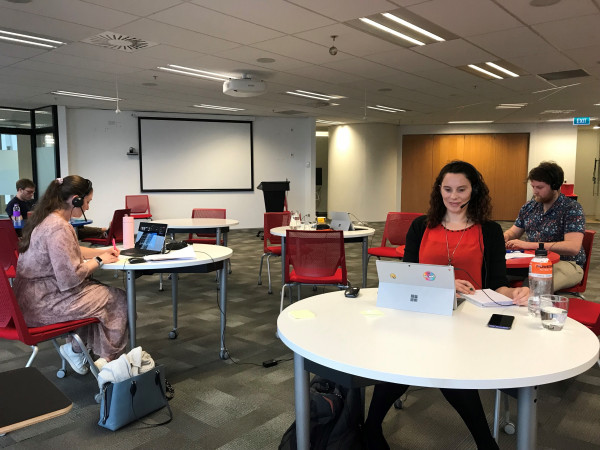
On Friday 29 October, Stats NZ hosted an open data workshop with attendees from across the public and private sectors, as well as New Zealand universities. With 7 speakers covering a range of topics, lots of questions and discussion, and an abundance of energy and enthusiasm, the two-hour online workshop flew by.
Craig Jones from Stats NZ opened the workshop and spoke about the government’s commitment to open data, and reflected on its inclusion in the recently published Government Data Strategy and Roadmap 2021.
Craig also acknowledged the achievements and closing of the Open Government Information and Data Programme on behalf of the Government Chief Data Steward (GCDS).
The Government Data Strategy and Roadmap 2021
Craig was followed by 6 speakers, each giving a 5 minute lightning talk.
Keitha Booth
Keitha used the Open Data Institute's data spectrum to explain what open data is and gave examples of data that are high value and should be made available as open data.
She also talked about the Global Data Barometer and its priorities for open data. We should be publishing with purpose, removing barriers to access, and providing appropriate metadata.
Byron Cochrane, OpenWork Ltd
Byron emphasised the importance of discoverability. He highlighted the need for training, 'how to' tutorials, best practice guides, and templates to support the adoption of metadata standards and the creation of useful and consistent metadata. Having somewhere, like catalogues, to store the metadata is key.
"Is it open if it can't be found? To discover data well, we need good and consistent metadata."
Ngapera Riley, Figure.NZ
Figure.NZ works to improve access to open data, enabling people and communities to make their own decisions.
The charity has recently worked with Māori to establish a Māori data platform and with Pacific people in Aotearoa to develop a Pacific data fale for Pasifika communities. Ngapera also noted interest from disabled communities and rangatahi for similar platforms.
"There's lots more work to do – let's do it together for Aotearoa."
Aimee Whitcroft, Waka Kotahi NZ Transport Agency
Aimee introduced the Transport Sector Open Data Framework which includes principles and high-level priorities to help the sector release open data and enable consistency and united efforts. People across the sector were involved in developing the framework, fostering a culture of working together and collaborating.
Aimee also talked about the context of the current open data landscape, particularly about the 'Third Wave' of open data. This highlights the need for collaboration and thinking about open data at a local scale to help communities.
"Nobody can do everything – we need to help each other."
How data openness can drive better outcomes for all – medium.com
Open data portal – Waka Kotahi
Third wave of open data – Open Data Policy Lab
Jonathan Ball, Toitū Te Whenua Land Information New Zealand (LINZ)
Jonathan took us on a whirlwind tour through some of the open data initiatives underway at LINZ. These include the PGF LiDAR work underway to collect 3d elevation data across NZ, creating fit-for-purpose datasets for emergency management and resilience, and conducting a channels review to understand how well LINZ channels are meeting the needs of customers.
Jonathan also shared longer term aspirations of releasing LINZ shared data as open data.
Key datasets for resilience and climate change – LINZ
LINZ licence for personal data – LINZ
Tracy Parsons, Manatū Aorere Ministry of Foreign Affairs and Trade (MFAT)
Tracy shared her recipe for raising awareness of open data and improving data stewardship practices at MFAT. Open data helps MFAT in many ways, including building organisational understanding of the value of data and demonstrating accountability for foreign aid spending.
Workshop attendees then discussed the NZ open data landscape, focusing on open data gaps and barriers to releasing and accessing open data.
In this discussion, accountability data was raised as important data that is currently under-represented in open data. Attendees referred to accountability data in a range of contexts.
Attendees also raised some interesting points about knowledge gaps and user needs.
Attendees highlighted metadata issues as a pain point.
Our thanks to everyone involved for making this a successful workshop. Special thanks to all our wonderful speakers for their thought-provoking presentations, and to attendees for their engagement and insights shared in the discussions.

Behind the scenes - Stats NZ hosting the online workshop.
In our follow-up survey we asked about interest in more workshops like this as well as in-depth discussions on open data related topics. Feedback suggests there is an appetite for this and we received some great suggestions for future topics.
There was also interest shown in an open data network. Connecting existing networks or reinvigorating old ones could be a great way to implement these suggestions and work together to achieve New Zealand's open data goals.
We're also exploring possible blog posts to provide more details about the topics our speakers touched on. We'll provide an update early next year.
If you’d like more information, have a question, or want to provide feedback, email datalead@stats.govt.nz
Photo by Viktor Forgacs on Unsplash
